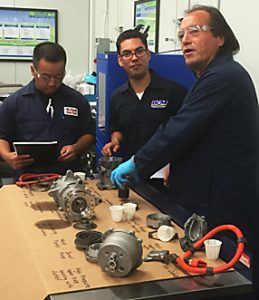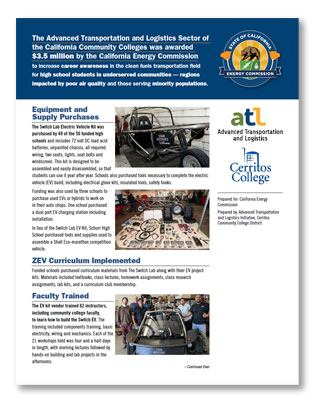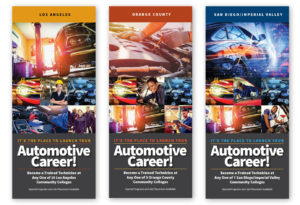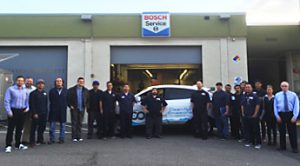
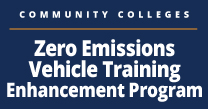 A More Technically Educated Workforce Becomes Critical
A More Technically Educated Workforce Becomes Critical
As State governments work to implement the ZERO emissions regulations over the next several years, a more technically educated workforce becomes critical. This is particularly evident in California where the Zero Emission Vehicle regulation (ZEV) requires that 1.4 million alternative fuel vehicles be sold by 2025. The Department of Energy is also adding the fuel cell technology and electric bus to the ZERO Emissions list which requires a new type of technician.
Rio Hondo College (RHC) has built one of the top programs in the U.S. in alternative fuels and is providing the quality instruction and certificate training required by employers. Funding provided by the California Energy Commission will give RHC the ability to expand its ZERO Emissions Institute of Technology (ZEIT) in a number of impactful ways.
Building Fuel Cell Golf Carts
The equipment purchased with this funding will enhance current technology courses to prepare students for anticipated changes in the alternative fuels workforce. This includes the addition of two Hydrogen Fuel Cell Simulators to RHC’s newly created electric vehicle and fuel cell lab, as well as a Toyota Miria.
Students participating in AUTO 265 will build, from the ground up, a hydrogen PEM fuel cell golf cart. RHC has purchased two carts already and will use the new funds to integrate hydrogen fuel cell technology to complete the project.
The addition of this new equipment allows RHC to deepen its Alternative Fuels and S.T.E.M. pathways/transfer programs by enforcing hands-on access to the most current mechanical, electrical and chemical technologies.
Industry Partners Assist with Curriculum Enhancements and Faculty Training
RHC will also enforce the existing curriculum by adding two new technologies for training: High-Voltage Safety and Service and Solid Oxide Fuel Cell Technology Fundamentals. The two courses will be introduced to students in spring of 2017, and working with California Fuel Cell Partnership to expand this curriculum to the industry.
Working with its partners CTE and SunLine’s Center of Excellence in Zero Emission Technology, RHC’s ZEIT will conduct a series of training workshops both at RHC and SunLine Transit in 2017 and 2018. Topics will include the updated courses developed, the new PEM fuel cell curriculum along with the first SOFC curriculum for power generation, partnering with Horizon Educational.
The PEM and SOFC curriculum will be the first of its type offered and will be a joint project between SunLine Transit and RHC’s Zero Emission Institute of Technology. These courses are intended to become contract education for fleet and dealer seminars.
A Promising Career Path for First-Generation College Students
As a designated Hispanic Serving Institution serving first-generation college students from predominately low-income families, RHC has a special interest in providing training for a career path out of poverty.
By working directly with employers, providing hands-on experiential learning and access to the latest technologies, RHC helps students overcome cultural barriers. Some first-generation graduates are now fully employed with companies like Honda, Tesla, Proterra, Penske and LA METRO, to name just a few.
Lead instructor, Professor John Frala enjoys working with his students in the program.
“I have a saying that my students know well,” he said. “I tell them, ‘Bring me your passion for education and I will teach you the technology.’”
Professor Frala was awarded the Outstanding Instructor’s Award in 2013 by the California Automotive Teachers Association. His RHC program blog, h2professional, features photos and videos of the latest student experiments, competitions, and classroom activities.

